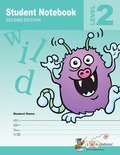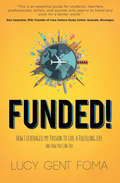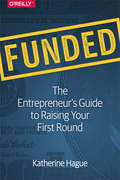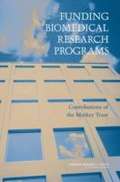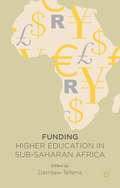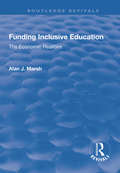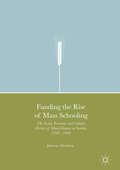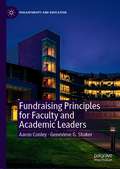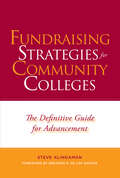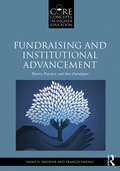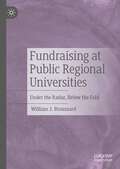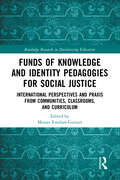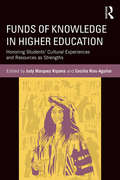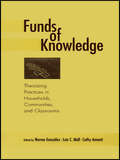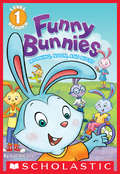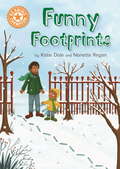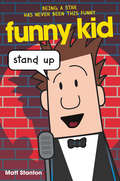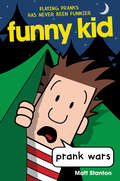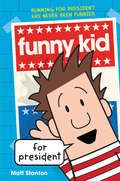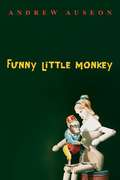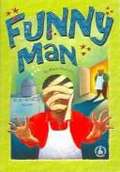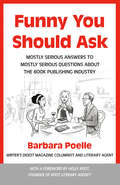- Table View
- List View
Funded!: How I Leveraged My Passion to Live A Fulfilling Life and How You Can Too
by Lucy Gent Foma&“An essential guide for students, teachers, professionals, artists, and anyone who yearns to travel and work for a better world&” (Ken Carpenter, PhD). You don&’t have to be an extraordinary student to get fellowships and pursue your passions. All it takes is strategic planning and a fellowship-writing skillset. Funded! tells the story of how an average student went on to win a Fulbright among other scholarships, fellowships, and grants to travel the world and pay for her Ivy League education. As a step-by-step guide taking you from the phase of dreaming about your project all the way to finding the right fellowship and preparing your application, Funded! makes the process manageable by breaking it into steps that anyone can follow. If you are looking for an inspiring career or want to activate a dormant passion in your work, Funded! will teach you the foundational skills to become the change agent you want to be. And for those who want to take time off from their regular job or switch careers, adding a grant, scholarship, or fellowship to their resume can help. Funded! tells you how to become the competitive applicant that these scholarship committees look for—including tips from actual Fulbright reviewers.
Funded: The Entrepreneur's Guide to Raising Your First Round
by Katherine HagueThe venture capital world is often intimidating and hard to navigate, even for the most seasoned entrepreneurs. But it doesn’t have to be. Entrepreneurs who run effective fundraising processes don’t do it by accident. With this book, you’ll learn what it takes to successfully raise a round of funding for your company.Author Katherine Hague explains how the venture capital industry works, and walks you through each step necessary to plan, execute, and optimize your own fundraising round. Packed full of exercises, checklists, and templates, this book guides you through the process from start to finish. It’s ideal for entrepreneurs raising later rounds of capital, as well as those just starting out.Gain an understanding of core venture capital concepts and standardsLearn how to develop and hone an investor pitchCome away with a plan to hit the fundraising trail for your companyDevelop the confidence you need to negotiate key terms in a funding dealUnderstand best practices in fundraising, and learn how to avoid the top 10 fundraising mistakes
Funding Biomedical Research Programs: Contributions of the Markey Trust (2006)
by National Research Council of the National AcademiesDuring an interval of 15 years, the Lucille P. Markey Charitable Trust spent over $500 million on four programs in the basic biomedical sciences that support the education and research of graduate students, postdoctoral fellows, junior faculty, and senior researchers. The Markey Trust asked the NRC to evaluate these programs with two questions in mind: “Were these funds well spent?” and “What can others in the biomedical and philanthropic communities learn from the programs of the Markey Trust, both as an approach to funding biomedical research and as a model of philanthropy?” One of five resulting reports, this volume examines the Research Program Grants, which awarded $323 million to support investigators with a major commitment to the life sciences and to assist in the establishment, reorganization, or expansion of significant biomedical research centers or programs. Using information from Markey archives, materials from grant recipients, and site visits to a sample of institutional grant recipients, the authoring committee describes the impact that Markey grants made on the centers and programs funded by these grants, along with the unique aspects of the Markey approach to funding that may be applicable to other funders of biomedical research programs.
Funding Higher Education In Sub-saharan Africa
by Damtew TeferraVirtually all countries in the world are struggling to provide the necessary resources to Higher Education. The challenges are particularly complex for economically poor countries in Africa, which have recorded massive expansion in the past decade. This book analyzes the state of funding and financing higher education in Sub-Saharan Africa.
Funding Inclusive Education: The Economic Realities (Monitoring Change In Education Ser.)
by Alan J. MarshThis title was first published in 2003.Funding for pupils with special educational needs has created resource management difficulties for schools and budgetary control problems for LEAs. Special educational needs is a frequent area of LEA overspending. These issues are particularly important as the development of inclusion and raising attainment for all pupils are key Government priorities. Many LEAs are now considering revisions of their funding formulae for additional and special educational needs during Best Value Reviews and Fair Funding consultations. This stimulating and accessible book examines the policy context for formula funding and the design and accountability issues for the construction of a revised formula. One of the central themes is the idea that a funding formula should be viewed as a key instrument of policy to assist in delivering specific inclusive policy objectives to meet the additional and special educational needs of pupils.
Funding the Rise of Mass Schooling
by Johannes WestbergThis book presents expert analysis on how the remarkable rise of mass schooling was funded during the nineteenth century. Based on rich source materials from rural Swedish school districts, and drawing up evidence from schooling in countries including France, Germany, England and the U. S. , Westberg examines the moral considerations that guided economic practices and sheds new light on how the advent of schooling did not only rest upon monies, but also on grains, firewood and cow fodder. Exploring school districts' motives and economic culture, this book shows how schooling was neither primarily guided by frugal impulses nor motivated by a fear of the growing working classes. Instead, school spending served multiple purposes in school districts that pursued a fair and reasonable economic practice. In addition to being a highly-detailed case study of Sweden 1840 - 1900 this book also entails a broadening of the theoretical horizon of history of education into social, agrarian and economic history in a wider context. With a focus on different systems of school finance, this work reveals a key change over time: from a largely in-kind system supporting schools in an early phase, followed by an increasingly monetarized, depersonalized and homogenized system of school finance. Boasting an interdisciplinary appeal, this will be a welcome contribution of interest to scholars in the fields of education history, sociology, and economics.
Funding your Career in Science
by Ritsert C. JansenDreaming of a successful future in science? This practical guide for students, postdocs and professors offers a unique step-by-step approach to help you get the funding to start or consolidate your own research career. From preparing and writing effective career grant applications, to understanding how funding agencies will evaluate them, it provides guidance to enhance your skills and combine them with those of others who can support you on the road to success. Learn how to generate great original ideas for your application, strategically prepare and optimise your plan and rsum, develop a convincing title and abstract, convert reviewers' comments to your advantage, and succeed at a selection interview. With numerous valuable tips, real-life stories and novel practical exercises, this must-read guide provides everything you need to optimise your funding opportunities and take responsibility for your own career in science.
Fundraising Principles for Faculty and Academic Leaders (Philanthropy and Education)
by Aaron Conley Genevieve G. ShakerThis book includes evidence-based insights and recommendations to help academicians excel in raising philanthropic support for their institutions and units. The book provides historical and contemporary perspectives on core concepts and data, research revealing donors’ giving motivations, engagement strategies and tactics for academic units, and guidance on management challenges including strategic plans, campaigns, and measuring performance. The authors include case studies in each section as examples of successful fundraising and volunteer-driven initiatives. The final section, contributed by Dean David D. Perlmutter, reinforces the book’s many practical and theoretical approaches to the fundamental responsibilities academic leaders face in raising philanthropic support. This book is grounded in the growing academic literature on philanthropy and written by scholars who were successful higher education fundraisers.
Fundraising Strategies for Community Colleges: The Definitive Guide for Advancement
by Steve KlingamanThis book is a co-publication with CASE.Fundraising Strategies for Community Colleges is a hands-on, step-by-step guide to building a million-dollar-a-year development office.Community colleges educate nearly half the undergraduates in America yet receive as little as two percent of all gifts to higher education. Private philanthropy is now essential to the mission of community colleges. In order to gain a fair share, community colleges can rely on this book to deploy strategies effectively used by 4-year colleges. The author, Steve Klingaman, has raised over $40 million dollars for two-year and four-year colleges over a 25-year development career.With its emphasis on planning the work and working the plan, Fundraising Strategies for Community Colleges offers practical advice and concrete steps on how to build a strong advancement team with robust Annual Fund, grants, major gifts, planned giving programs.Topics include:* Strategies used at one two-year college that raised $50 million over ten years* 75 boxed tips on the details that matter most* How to create an institutional commitment to advancement* How to enhance the advancement function* How to build an effective foundation board that gives* How to grow the Annual Fund with sustainable, repeatable gifts* Secrets top universities use to close major gifts* Continuous quality improvement techniques to improve results year after year.Fundraising Strategies for Community Colleges is the only comprehensive development guide to focus on community college fund raising. Written for development professionals, college presidents, board members, trustees, faculty leaders, and other college leadership, this book is an essential, practical guide that fills a critical gap in the market.
Fundraising and Institutional Advancement: Theory, Practice, and New Paradigms (Core Concepts in Higher Education)
by Noah D. Drezner Frances HuehlsIn this timely textbook, authors Drezner and Huehls take the interdisciplinary, complex nature of the study of philanthropy and fundraising and apply it to the field of higher education. Covering issues of increasing importance to institutions—including donor cultivation, growth of fundraising at community colleges and minority institutions, engagement of young alumni, volunteerism, and the competing roles of stakeholders—this book helps readers apply theory to the practice of advancement in post-secondary education. Special Features: Coverage of historical and theoretical underpinnings and insights from related literature and research. Discussion of new donor populations including women, communities of color, the LGBTQ population, students, and young alumni. On-the-ground case studies bring theories into focus by creating a bridge to experience and action. Practical implications for the design of fundraising campaigns and strategies. Guiding questions that encourage students to think beyond the current literature and practice. This textbook bridges research, theory, and practice to help higher education administrators and institutions effectively negotiate the fundraising terrain and advance their institution.
Fundraising at Public Regional Universities: Under the Radar, Below the Fold
by William J. BroussardThis book examines fundraising engagement and the university advancement and development professionals who make it happen at public regional universities in the United States. These institutions are disproportionately under-resourced by state and federal subsidies, and private fundraising has become increasingly relied upon by students attending these institutions while the actual fundraising departments remain understaffed, overworked, and struggling to capture the imaginations of private donors and corporate and family foundations. The book focuses on how advancement professionals at these institutions across the nation have overcome the aforementioned challenges to attain support for their universities unchanging missions in these ever-changing times—to educate a critical mass of United States’ future citizens, workforce, and leaders while providing a socioeconomic ladder to its most vulnerable students.
Funds of Identity: Social, Cognitive and Computational Perspectives)
by Moisès Esteban-GuitartDrawing on research conducted mostly in Catalonia (Spain), Moisès Esteban-Guitart outlines a distinct vision of education enhanced by students' identities, which leads to a discussion of the sociocultural factors that shape the processes of learning. He brings these ideas to life by examining traits of a mobile-centric society, the present-day ecology of learning, and his three metaphors of learning (connecting knowledge, connecting minds, and connecting communities). He then suggests a number of basic principles regarding learning for the twenty-first century based on prior literature in the learning sciences. He presents the terms 'funds of identity' and 'meaningful learning experiences', and reviews the funds of knowledge approach and the Vygotskian basis for understanding identity. In the second part of the book, he illustrates a number of strategies for detecting students' funds of identity and their meaningful learning experiences, and describes some practical experiences based on the theoretical framework he adopted. Revises theoretical principles for education in the twenty-first century. Develops and illustrates how to use students' identity pedagogically. Addresses the situated and distributed nature of learning.
Funds of Knowledge and Identity Pedagogies for Social Justice: International Perspectives and Praxis from Communities, Classrooms, and Curriculum (Routledge Research in Decolonizing Education)
by Moises Esteban-GuitartThis edited volume takes the US-derived concept and praxis of funds of knowledge and applies it globally to critically analyse current education in line with social justice, antiracism, and culturally sustaining pedagogies. Edited by one of the premier international voices for the funds of knowledge approach, and in particular funds of identity theory, chapters foreground first-hand, participatory, research-practice experiences with learners, schools, and local communities. These experiences demonstrate the positive, social-justice inspired pedagogical actions that result in, and reveal, powerful possibilities for a decolonialised, antiracist praxis that aims to eradicate deficit thinking in education. Further, the inclusion of voices that are typically "othered" in the construction and distribution of academic knowledge make this a seminal volume in the field. Ultimately, the volume will be of interest to scholars, students, and researchers working in the sociology of education, psychology of education, and those specifically dealing with antiracism, decolonialism, and equity within education.
Funds of Knowledge in Higher Education: Honoring Students’ Cultural Experiences and Resources as Strengths
by Judy Marquez Kiyama Cecilia Rios-AguilarRefining and building on the concept in a sophisticated and multidisciplinary way, this book uses a funds of knowledge approach and connects it to other key conceptual frameworks in education to examine issues related to the access and transition to college, college persistence and success, and pedagogies in higher education. Research on funds of knowledge has become a standard reference to signal a sociocultural orientation in education that seeks to build strategically on the experiences, resources, and knowledge of families and children, especially those from low-income communities of color. Challenging existing deficit thinking in the field, the contribution of this unique and timely book is to apply this concept to and map future work on funds of knowledge in higher education.
Funds of Knowledge: Theorizing Practices in Households, Communities, and Classrooms
by Luis C. Moll Norma González Cathy AmantiThe concept of "funds of knowledge" is based on a simple premise: people are competent and have knowledge, and their life experiences have given them that knowledge. The claim in this book is that first-hand research experiences with families allow one to document this competence and knowledge, and that such engagement provides many possibilities for positive pedagogical actions. Drawing from both Vygotskian and neo-sociocultural perspectives in designing a methodology that views the everyday practices of language and action as constructing knowledge, the funds of knowledge approach facilitates a systematic and powerful way to represent communities in terms of the resources they possess and how to harness them for classroom teaching. This book accomplishes three objectives: It gives readers the basic methodology and techniques followed in the contributors' funds of knowledge research; it extends the boundaries of what these researchers have done; and it explores the applications to classroom practice that can result from teachers knowing the communities in which they work. In a time when national educational discourses focus on system reform and wholesale replicability across school sites, this book offers a counter-perspective stating that instruction must be linked to students' lives, and that details of effective pedagogy should be linked to local histories and community contexts. This approach should not be confused with parent participation programs, although that is often a fortuitous consequence of the work described. It is also not an attempt to teach parents "how to do school" although that could certainly be an outcome if the parents so desired. Instead, the funds of knowledge approach attempts to accomplish something that may be even more challenging: to alter the perceptions of working-class or poor communities by viewing their households primarily in terms of their strengths and resources, their defining pedagogical characteristics. Funds of Knowledge: Theorizing Practices in Households, Communities, and Classrooms is a critically important volume for all teachers and teachers-to-be, and for researchers and graduate students of language, culture, and education.
Funk Bass Guitar Lines: 20 Original Funk Bass Lines with Audio & Video (Bass Guitar Lines #1)
by Gareth Evans20 Original Funk Bass Guitar lines in tablature and notation for the intermediate to advanced bassist, plus an extra bonus Bass line. >> 89 bars of music over 21 Bass lines (average Bass line length 4.2 bars) >> Video at full speed & Audio at full & half speed (Downloadable) >> Backing tracks at full and slower practise speeds (Downloadable) >> Theory and technique tips for each Bass line Please Note: This eBook has written music and is not suitable for smaller screens.
Funny Bunnies: Morning, Noon, and Night (Scholastic Reader, Level 1)
by Sue DiCiccoSweet, colorful artwork and fun, rhyming text throughout!FUNNY BUNNIES is an adorable, true early reader about a big bunny family's day. These funny bunnies wake up with the sun, spend a fun-filled afternoon playing in the park, and then return home at night. With colorful bunnies, simple rhyming text, and humorous moments scattered throughout, this leveled reader is sure to grab young readers' attention!
Funny Footprints: Independent Reading Orange 6 (Reading Champion #149)
by Katie DaleIn this story, it is Ben's birthday and it is snowing! He goes for a walk with Dad and sees some very funny footprints in the snow. Where could they lead?Reading Champion offers independent reading books for children to practise and reinforce their developing reading skills.Fantastic, original stories are accompanied by engaging artwork and a reading activity. Each book has been carefully graded so that it can be matched to a child's reading ability, encouraging reading for pleasure.Independent Reading: Orange stories are perfect for children aged 5+ who are reading at book band 6 (Orange) in classroom reading lessons.
Funny Kid #2: Stand Up (Funny Kid #2)
by Matt StantonBig Nate meets Timmy Failure in Funny Kid #2: Stand Up, the second book in an uproarious new middle grade series by Matt Stanton, Australia’s bestselling children’s book author. Max may not be the strongest, or the smartest, or the handsomest kid in his class—but he may well be the funniest! Except when Max’s classroom joke lands flat, he suddenly becomes the Un-Funny Kid!The only way to make everyone forget Max’s comedy catastrophe is for him to win the town talent quest with his very own stand-up comedy routine. Max is ready to bring comedy gold to his audition, but thanks to a heckling clown, Max can’t even remember his first joke!With the help of his best friend Hugo and their feathered pet, Duck, Max thinks he has everything he needs to come up the greatest stand-up comedy routine of all time—but will it be enough? Max will need all the advice he can get to prove that he is the kid who can make everyone laugh! Matt Stanton brings his veteran children’s book chops to this hilarious series, perfect for early middle grade readers looking for side-splitting laughs!
Funny Kid #3: Prank Wars (Funny Kid #3)
by Matt StantonBig Nate meets Timmy Failure in Funny Kid #3: Prank War, the third book in the uproarious highly illustrated middle grade series by Matt Stanton, Australia’s bestselling children’s book author.Max is the Funny Kid and, given the choice, he’d always rather laugh than fight. But when a prank war breaks out just before the big overnight class trip, Max has no choice but to pull off the funniest prank ever! Gunker dragons, duck smugglings, stolen suitcases, lethal super-beans, and the greatest prank ever played are just some of the hilarious antics in store. Paired with hilarious black-and-white illustrations from the author, Max’s mishaps will leave even the most reluctant reader laughing out loud. Matt Stanton again brings his bestselling children’s book chops to the hilarious Funny Kid series, perfect for early middle grade readers looking for side-splitting laughs and lovable, relatable characters!
Funny Kid for President
by Matt StantonBig Nate meets Timmy Failure in Funny Kid for President, the first book in an uproarious new middle grade series by Matt Stanton, Australia’s bestselling children’s book author. When Max gets blamed for pooping in the storeroom (which he did NOT do), tensions hit an all-time high between him and his terrifyingly large teacher, Mr. Armstrong. But then, the most unexpected thing happens—the school principal, Mrs. Sniggles, suggests Max run for class president.Max isn’t the only kid on the ballot, however. His archenemy, Abby Purcell, is also up for election—and she’s out to defeat him at all costs. To win, Max is going to need the 24/7 help of his best friend, Hugo, and he’s going to have to run the campaign of a lifetime.Max may not be the smartest or fastest kid, or the handsomest, but he just might be the funniest kid you’ll ever meet—and it’s this talent that could turn him from underdog to top dog. Max for President! Matt Stanton brings his veteran children’s book chops to this hilarious new series, perfect for early middle grade readers looking for side-splitting laughs!
Funny Little Monkey
by Andrew AuseonArty, an abnormally short fourteen-year-old boy, enlists the help of a group of students, known at school as the "pathetic losers," to take revenge against his abusive, tall fraternal twin brother.
Funny Man
by Margo Sorenson Sue CornelisonEighth-grader Derrick wants to be a stand-up comedian, but his football coach, his parents, Joe, his boss at Taste of Italy, his English teacher Dowling the Dragon, and his Mr. Perfect older brother Craig don't think he's so funny. When Derrick discovers he needs a B on an English paper, he receives help from an unexpected source so that he can continue to play football... He learns that he must control himself to achieve this goal. He also gets a good lesson on self reliance and comes to realize how his actions can affect other people.
Funny You Should Ask: Mostly Serious Answers to Mostly Serious Questions About the Book Publishing Industry
by Barbara PoelleThere is a certain perception from the outside that the publishing industry is a near insurmountable fortress, with gatekeepers and naysayers manning the turrets looking for any way to fire a flaming arrow at the dreams of an aspiring writer. Funny You Should Ask, based on the popular Writer's Digest column of the same name, assists to deconstruct, inform, and illuminate the path to publication and beyond, all while dispelling the rumor that those in the industry are better than thou. And even though each writer's publishing journey is like a game of PLINKO--you can drop the chip in the same slot every time and get a different result--there are still common constructs and confusions that can be shared and explored together in order to help inform all writers. From understanding the nuts and bolts of a query letter, to learning how to process the soul-searing envy of watching someone else's career flourish, to how to talk to your editor, veteran literary agent Barbara Poelle covers the approach and execution of the common and uncommon bumps along the traditional publishing path. Includes • More than 100 questions answered including expanded answers to topics that didn't get the full treatment in a column • Writing exercises, submission checklists, and publishing BINGO for every publishing milestone
